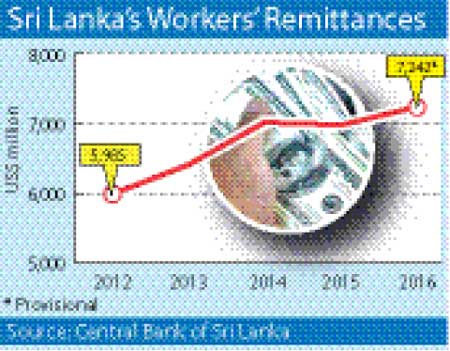Tuesday Feb 24, 2026
Tuesday Feb 24, 2026
Friday, 16 June 2017 00:00 - - {{hitsCtrl.values.hits}}
 London (Thomson Reuters Foundation): Migrants working in rich countries sent home almost half a trillion dollars in 2016, helping to lift families out of poverty by providing financial stability, access to education, housing and healthcare, according to a global report.
London (Thomson Reuters Foundation): Migrants working in rich countries sent home almost half a trillion dollars in 2016, helping to lift families out of poverty by providing financial stability, access to education, housing and healthcare, according to a global report.
About 200 million migrants, half of whom are women, sent $445 billion to their families in Asia, Latin America and Africa in 2016, the International Fund for Agricultural Development (IFAD) said on Wednesday.
The total amount of remittances, which is estimated to reach $450 billion in 2017, has risen by more than 50% in the past decade, IFAD said.
“It is a truly a global phenomenon in which people, due to lack of opportunities, have to leave their families behind to provide for them,” said Pedro De Vasconcelos, IFAD policy advisor and author of the report.
“Migration should be an option, a choice. But for 200 million people, it’s a necessity,” he told the Thomson Reuters Foundation in a phone interview.
Most remittances ($117 billion) came from the United States, followed by Europe ($115 billion) and the Gulf states ($100 billion).Total migrant worker earnings are estimated to be $3 trillion annually, of which approximately 85% remains in the host countries. The money migrants send home averages less than one percent of their host country’s gross domestic product, IFAD said.
The report said families back home receive an average of $200 a month, which makes up 60% of the household income.
Using the steady flow of remittances, families can buy food, get housing, go to school, access healthcare, improve sanitation, or even invest in a business and have some savings, the report said.
De Vasconcelos said relying on remittances is a symptom of poverty in developing nations that pushes people to find economic opportunities abroad.
He said helping families use the money more productively could help reduce poverty, and in turn, prevent people from migrating in the first place.
“Remittances are a symptom, but (they) ... can be used to have a long-term positive effect in the economies where these funds are going,” he said.
Ways to maximise remittances include getting private companies to reduce money transfer fees to poor remote areas, providing financial literacy to families, or promoting climate insurance to those in rural areas so they can cope better with disasters like floods, cyclones or droughts, the report said.